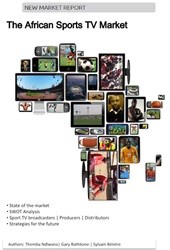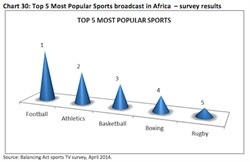Opportunities in the sports TV sector in Africa
Balancing Act polled TV channels sports experts, federations, sports programmes distributors and advertising agencies to uncover catalogues of sports TV programmes available, budgets spent by TV channels on sports programmes and major opportunities.
Results
Plenty of opportunities to improve the sports TV economy in Africa: Grow and diversify the local sports content (co)production sector, set up African sports rights distribution agencies, clarify sports rights' regulations, increase the African sports coverage across Africa and globally, and much more.
The simultaneous growth of the African economy, the booming African TV market and the global sports segment are the ultimate concoction of enablers that are going to individually and collectively fuel and accelerate the development of the African sports TV market.
- African economies are going through a boom period and this has a spillover effect on most African industries and sectors.
- The African media industry is going to be affected and ultimately benefit from the overall African economic boom. Furthermore the digital migration is transforming and changing the African TV landscape as more channels are being created. With digital migration creating a lot of airtime for sports, supply for sports content to African FTA broadcasters will increase. There is, however, relatively low supply of locally produced sports content.
The investment in local sports content production and distribution is a realistic opportunity but it has to be in conjunction with investment in local sports infrastructure which still needs significant development. Local sports content is cheaper to produce in Africa than in the Western World. Sports content whether local or international still has modest returns on investment compared to more developed markets. Live sports events are a good opportunity to invest in and sports federation need to be actively and aggressively selling their content to increase their customer base and revenues.
- This bodes well for the developing sports TV market because the audience will have access and be exposed to a wider variety of sports content. The African Sports audience, which is increasingly becoming well off and demanding, is the growing middle class mixed with a youthful market with disposable income.
The global sports market is a robust economy that has not been affected by the global economic depression with a 3.4% annual growth for the last decade. Sports programming has priority in the programming budget allocations and the SSA FTA TV sports programming budget is estimated to be $400 million. It is projected to grow by 60% in 2030 and it will be worth more than a billion dollars then.
These three factors will ignite the growth of the African sports TV market into the next decade.
There are various deficiencies that are inherent in the supply and demand dynamics of the African sports TV sectors ecosystem and they are largely due to the nature of historical development of the market. The domination of football content in the sport programming allocation across Africa is stifling the development of other non-football sports content.
This results in majority of the sports viewers not being exposed to other sports and possibly limiting their enthusiasm and participation. Simultaneously the monopoly of sports rights by large pay TV platforms is also limiting the exposure of other sports to the mass market. The available sports content has to compete with other entertainment content because there are a few sports dedicated channels.
Expensive to acquire for local TV channels
The supply of local content, although an opportunity, is still a threat to the development of local sports content market. International sports content domination of the market has assisted in the systematic disinvestment into the local sports infrastructure. The inferior quality of locally produced sports content is not helping to drive the demand for it. While international live sports games are in demand, they are nonetheless very expensive to acquire for local TV channels.
African TV broadcasters often struggle to make the necessary returns from their investment in international sports content. The unwillingness of broadcasters to share broadcasting rights with each other does not solve the exorbitant price problem.
Sports programmes suppliers are increasing finding constraints in accessing the market; therefore their perception of the market is that sports content is in low demand and is not a profitable segment. The lack of audience knowledge and market research is one of the hindrances (listed in this report) to the development of the sports TV market on the African continent.
For more, purchase the full report.
Source: Balancing Act
























